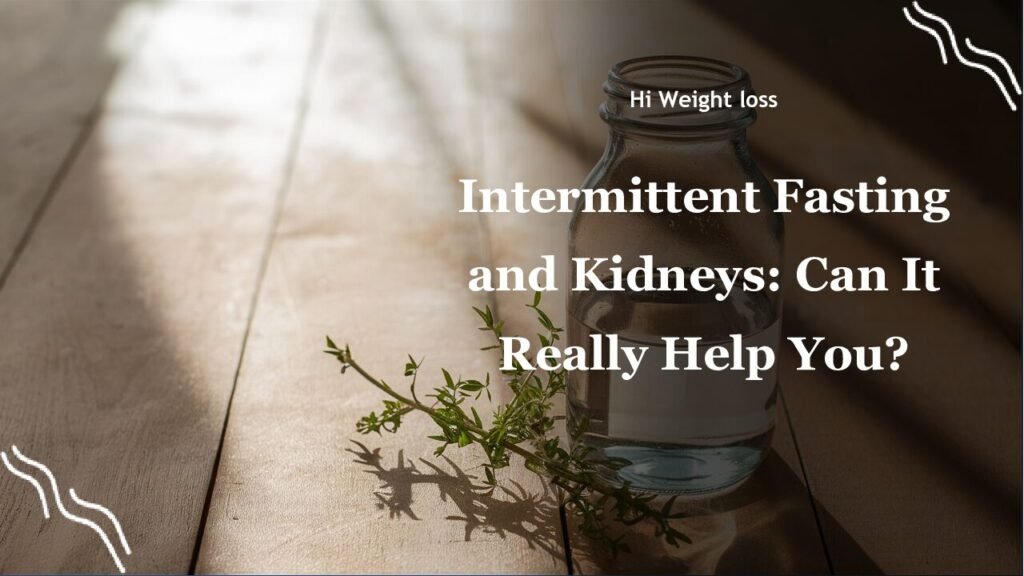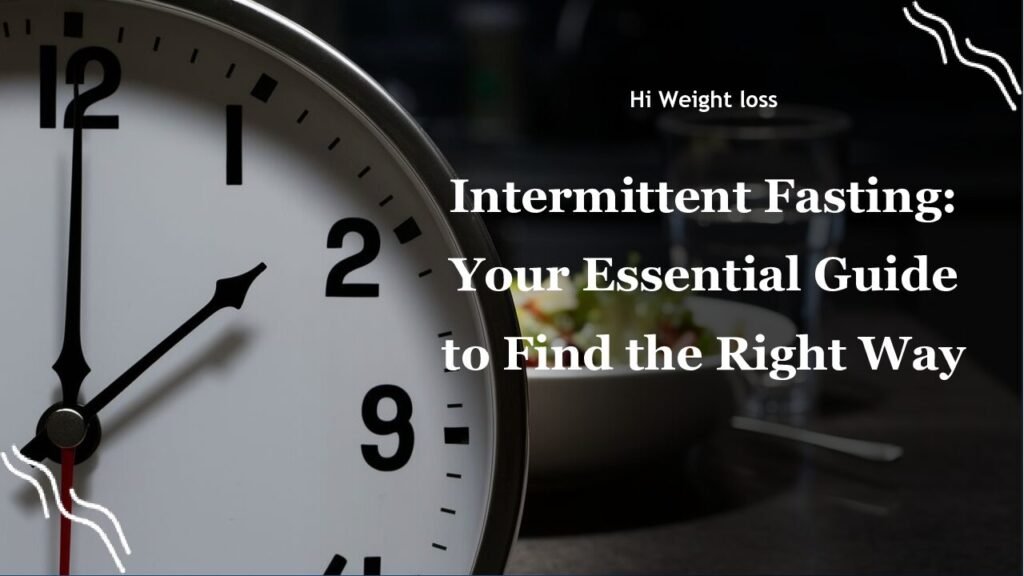Are you worried about your kidney health and exploring different ways to support it? You’re not alone, many people are searching for lifestyle changes that could make a difference. It’s like a friend of mine, Sarah, who was diagnosed with early-stage kidney disease and felt lost about what to do next. The good news is that _intermittent fasting_ is emerging as a potential ally for kidney health, and in this article, we will explore how it works, and see if _intermittent fasting_ is good for your kidneys, providing you with in-depth, reliable information so you can understand its potential benefits.
Is Intermittent Fasting Good for Your Kidneys?
Understanding the Basics of Intermittent Fasting
Before diving into the impact of _intermittent fasting_ on kidney health, let’s quickly recap what it is. _Intermittent fasting_ isn’t a diet, but rather an eating pattern. It involves cycling between periods of eating and voluntary fasting on a regular schedule. There are several methods, including the 16/8 method (fasting for 16 hours daily and eating within an 8-hour window), the 5:2 diet (eating normally for five days of the week, and restricting calories on the other two days), and alternate-day fasting (fasting every other day). You don’t have to be too strict with the time, pick an eating pattern that best suits your needs.
The rationale behind _intermittent fasting_ is that it gives your body a break, allowing it to focus on cellular repair processes, including those in the kidneys. I once tried the 16/8 method and, although initially challenging, I felt more energized and focused during my fasting periods.
Intermittent Fasting and Chronic Kidney Disease (CKD): What Does the Research Say?
Now, let’s explore how _intermittent fasting_ might benefit those with chronic kidney disease (CKD). Research suggests some positive outcomes. A study presented at the American Society of Nephrology’s Kidney Week in 2020 showed a significant increase in estimated glomerular filtration rate (eGFR) in a small group of patients with CKD who practiced _intermittent fasting_ for four months or more. This is not a small improvement, the median increase in eGFR was 6.5 ml/min/1.73 m², compared to the average annual decline in GFR of 1.5-2 ml/min/1.73 m² in the general CKD population. This study demonstrates that _intermittent fasting_ may help the kidney function better, and you can learn more by checking the research on _eGFR improvement_.
Another aspect of kidney health is albuminuria (a high amount of protein in the urine), a sign that the kidneys may be damaged. Research has shown that individuals with type 2 diabetes and diabetic nephropathy who followed a fasting-mimicking diet had a reduction in albuminuria levels. Therefore, _intermittent fasting_ could help improve this situation, and you can find more information from this research on _reduced albuminuria_.
Furthermore, _intermittent fasting_ is believed to slow down the progression of CKD, due to its ability to improve metabolic health and reduce fibrosis (scarring) in the kidneys. A study on polycystic kidney disease (PKD) also found that _intermittent fasting_ reduced cyst growth and fibrosis. These findings hint at the potential for _intermittent fasting_ to protect kidneys and these findings can also be seen from this study on _polycystic kidney disease_.
These findings are indeed promising, however, it’s worth noting that all these research studies are still in the early stages, and more research is needed before the long term effect on _intermittent fasting_ for kidney health can be fully understood. If you are considering trying this you should consult with a healthcare professional.
How Does Intermittent Fasting Help the Kidneys?
Let’s explore the possible mechanisms behind why _intermittent fasting_ could help your kidneys. Firstly, it reduces the workload on the kidneys by allowing the body to rest from constant digestion, giving your kidneys a break. It also improves metabolic health, which means it can help with things like blood sugar control and blood pressure which are important for kidney health.
Additionally, _intermittent fasting_ can trigger cellular repair processes, helping to reduce inflammation and oxidative stress that may damage the kidneys. Think of it as giving your body a chance to clean house and fix any damaged parts. I know for me, even small changes like skipping dinner and sticking to a 12-hour fast felt beneficial – my body felt less bogged down, and more energetic. Remember, this is not medical advice but a discussion of current thinking.
Here’s a summary of how _intermittent fasting_ may benefit kidney health:
- May improve eGFR
- May help to reduce albuminuria
- May help to slow the progression of CKD
- May trigger cellular repair process
Practical Considerations for Starting Intermittent Fasting
If you’re thinking about starting _intermittent fasting_ for kidney health, here are some practical tips. Firstly, always consult a healthcare professional, especially if you have an existing kidney condition, diabetes, or any other medical issue. Do not consider _intermittent fasting_ as a replacement for standard treatments. A good doctor should advise whether it is suitable for you, and provide you with some tailored advice.
Start gradually; don’t jump into a 16-hour fast right away. Begin with a 12-hour overnight fast, and slowly increase the fasting window. For example, I began my journey by skipping snacks between meals and then moved onto extending my overnight fast. It’s crucial to listen to your body, and stop if you experience any negative symptoms.
It’s also very important to stay hydrated during your fasting periods, and make sure that when you do eat you have a balanced and nutritious diet. This should include plenty of fruits, vegetables, lean proteins, and whole grains. It is beneficial to combine it with some regular exercise, such as brisk walking or swimming.
Here is a table that summarises the key steps to consider before and during _intermittent fasting_:
| Step | Description |
|---|---|
| Consult a professional | Check with your doctor if _intermittent fasting_ is safe for you. |
| Start Gradually | Begin with a shorter fasting window and then extend. |
| Hydrate | Drink water and other fluids during fasting periods. |
| Eat Well | When eating, choose nutritious and balanced meals. |
| Exercise | Combine _intermittent fasting_ with regular exercise. |
Potential Risks and Precautions
While _intermittent fasting_ shows promise, there are some potential risks to consider. If you have diabetes, you might experience fluctuations in blood sugar levels, so very careful monitoring is required. If you are taking medication for kidney issues then it may not be safe for you to fast, so always seek medical advice.
Additionally, some people may experience side effects like fatigue, headaches, or dizziness, especially when first starting. For me, in the early stages, I had to adjust to feeling a little hungry during my fasting times. However, these symptoms should improve as your body adapts to this eating pattern. If they do not improve, then it may not be a suitable practice for you. If you have a history of eating disorders, you should not engage in _intermittent fasting_. Remember, listen to your body and be aware of any negative symptoms you may have.

It’s also important to remember that _intermittent fasting_ is not a quick fix. It’s a lifestyle change, and it may take a while to see results. The most important thing to do is to consult with a healthcare professional, especially if you are suffering from an existing health condition. They can provide personalised advice, and determine if it is suitable for you.
Conclusion
So, is _intermittent fasting_ good for your kidneys? The answer, based on current research, appears to be that _intermittent fasting_ may have some potential benefits for your kidneys, especially if you are suffering from chronic kidney disease. From the research, we have seen that _intermittent fasting_ may lead to an increase in eGFR, a reduction in albuminuria, and a reduction in the progression of CKD, and I can see why Sarah, my friend, was looking into this method. However, this research is still in its early stages, and more evidence is required before any definitive conclusions can be made. You should never use _intermittent fasting_ as a replacement for standard medical treatments.
If you are thinking of trying out _intermittent fasting_, please make sure you speak to a healthcare professional first. Start slow, listen to your body, and be aware of any potential risks. _Intermittent fasting_ should be considered as part of an overall healthy lifestyle, combining good eating habits and some regular exercise. Share this article with others that may be interested in the potential benefits of _intermittent fasting_ and let’s start a conversation!
FAQ
Can intermittent fasting cure kidney disease?
No, _intermittent fasting_ is not a cure for kidney disease. It can be part of a comprehensive treatment plan to help support kidney function, but it does not replace the need for medical advice and treatments.
Is intermittent fasting safe for people with CKD?
It can be, but it’s very important to speak to your doctor first. They can consider your specific circumstances and determine if _intermittent fasting_ is safe for you.
What type of intermittent fasting is best for kidney health?
The best type of _intermittent fasting_ varies from individual to individual. The most important thing is to ensure it is suitable for you. Consider starting with a 12-hour fast and gradually increasing, and find a schedule that suits you.
Can intermittent fasting cause kidney damage?
When done correctly, _intermittent fasting_ should not cause kidney damage. However, you should be careful to stay hydrated, maintain a balanced diet, and consult a healthcare professional to ensure that it’s safe for you. If you experience any adverse side effects then it may not be suitable for you.
How long does it take to see the benefits of intermittent fasting for kidneys?
The benefits of _intermittent fasting_ will depend on several individual factors, such as your health condition and lifestyle. Some may see improvements within months, whilst others may take longer to see results.



